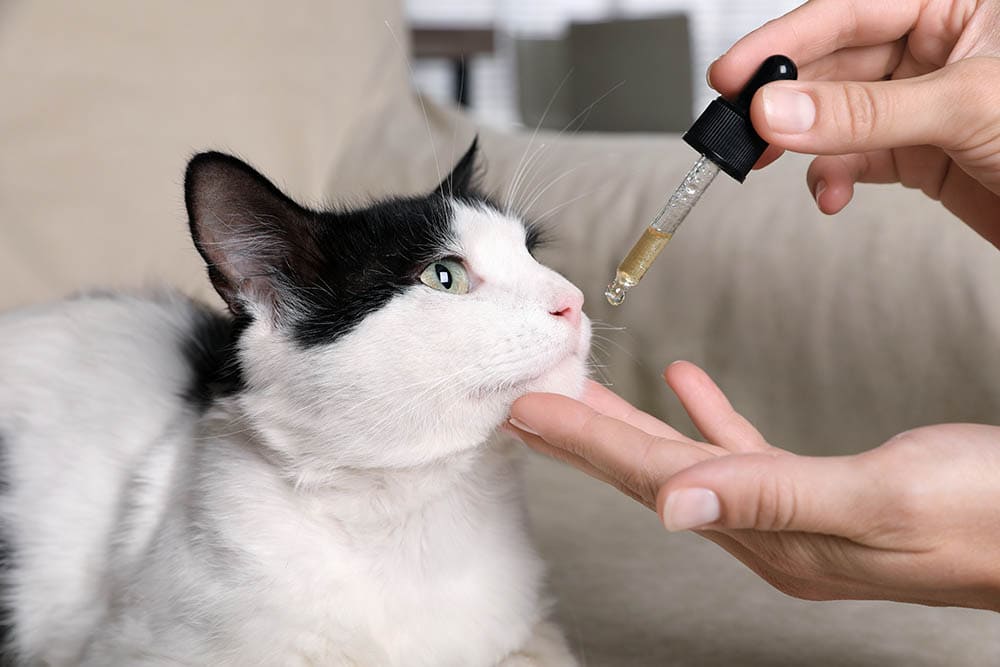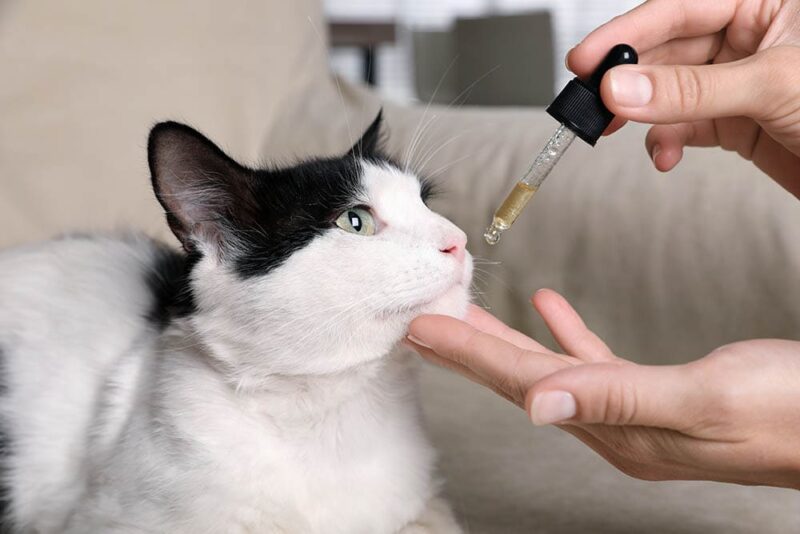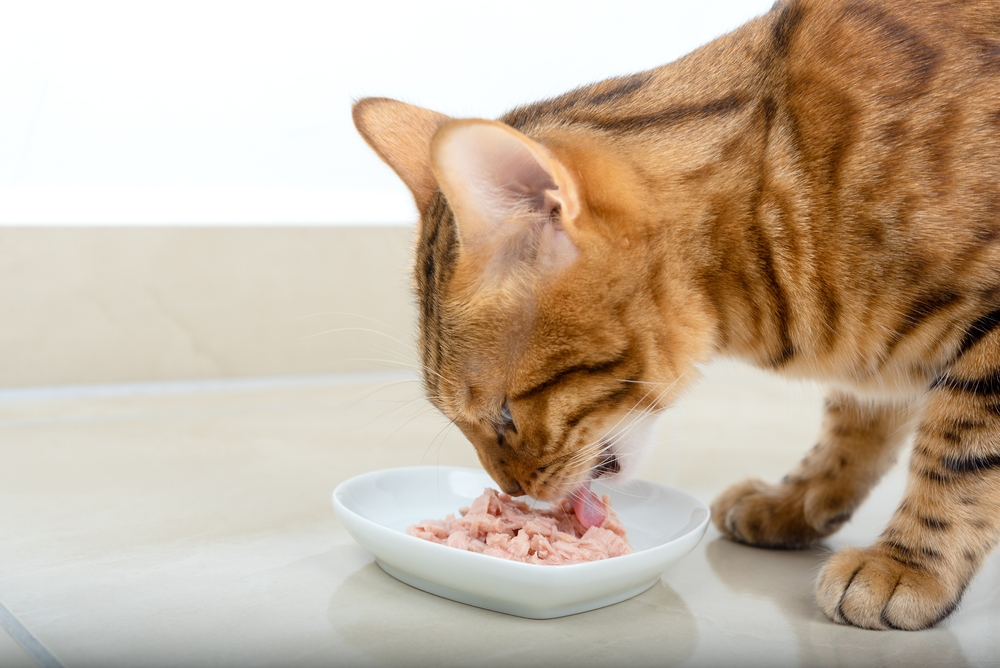Cat’s kidneys play a crucial role in their overall health. If your feline’s kidneys fail, the resulting problems can be life-threatening. Chronic Kidney Disease, or CKD, is one of the most common conditions affecting senior cats.
If your cat has already been diagnosed with CKD, you may be wondering how you can help them. Sadly, Chronic Kidney Disease has no cure, but you can lessen their symptoms. CBD Oil, a holistic craze for humans and pets alike, can help your frisky feline. Consuming CBD can cause therapeutic effects that can relieve the symptoms of kidney diseases overall. CBD oil can help your cat with kidney disease by relieving symptoms like nausea, pain, inflammation, and anxiety.
While CBD oil is helpful for cats with kidney diseases, it is not FDA-approved. You should always talk to your veterinarian before adding CBD to your cat’s routine.
Kidney Disease in Cats
As its name implies, kidney disease attacks the body’s kidneys. The kidneys’ main function is to filter blood and toxins; the important compounds return to the bloodstream while the rest is moved to the bladder to be expelled as urine. Your cat’s kidneys help control blood pressure, produce important hormones, and remove metabolic waste from the blood.
As your cat ages, its kidneys may start to deteriorate. This can affect your cat’s normal body functions and make restroom use more difficult or painful. The more damage sustained to your cat’s kidney over time, the higher chance your furry friend will develop full-fledged kidney disease. Catching kidney disease before the symptoms are glaringly obvious is difficult and incredibly important, as typical signs of kidney failure do not appear until at least 75% of the overall kidney function is already lost.
Chronic kidney disease (CKD) is one of the most common diseases affecting domesticated cats. An average of 30% of cats will experience kidney disease during their life, and CKD is more common in older and even middle-aged cats. If your cat is over 12 years old, they are more likely to experience a form of kidney disease.
- Acute Renal Failure: This is most commonly caused by poisoning or directly damaging the kidney. It can develop quickly over a few days or weeks.
- Chronic Kidney Failure: There is no cure for this type which develops over months and years.
Kidney disease can be caused by multiple factors, including genetics, blockages, trauma, ingesting toxins, chronic dehydration, and old age.
What is CBD Oil & Is It Safe for Cats?
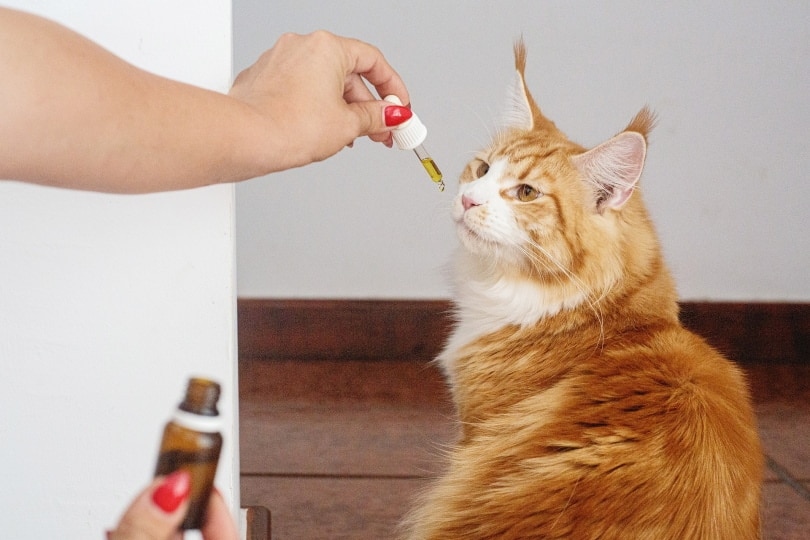
CBD stands for cannabidiol, one of the many compounds available in the cannabis plant. While some people confuse CBD for marijuana, CBD is different from actual marijuana and hemp products. Cannabidiol is separate from cannabinoid TCH. CBD is not a psychoactive substance and will not result in a high when consumed by humans or pets.

How Does CBD Benefits Cats with Kidney Disease
CBD is not a one-stop-shop cure for kidney disease, but it can help your cat manage the symptoms they experience. Traditional kidney disease treatments also focus on managing symptoms. CBD is a useful tool to help alleviate some of our cat’s pain, inflammation, and even the anxiety or stress caused by the disease.
Pain Control
Giving your cat CBD oil can help them to reduce their overall pain levels. Just as it works with humans, CBD stimulates the pain receptors and causes them to reduce their release of pain-inducing chemicals in the brain and body. This isn’t a permanent solution, but it can provide your cat relief.
Decrease in Inflammation Within the Body
Damage to the body causes inflammation. If you damage your wrist, it will swell. Cat’s kidneys can suffer from inflammation as soon as their body realizes their kidneys are damaged. Damaged kidneys cause your cat’s body to release inflammatory chemicals to bring immune cells to the injured site. The rush of immune cells to your cat’s kidneys will cause low-grade inflammation of the kidneys. The longer your cat is suffering from inflammation, especially chronic inflammation, the more overall damage to the organ and your cat’s body. Chronic inflammation can cause your cat to suffer from more symptoms and may even speed up the disease’s progression.
According to some studies, CBD has anti-inflammatory properties and is a treatment for inflammation and pain in humans and pets. No specific studies have occurred on CBD’s direct effect on pain reduction, but there are plenty of stories and word-of-mouth claims explaining how CBD has helped overall pain management.
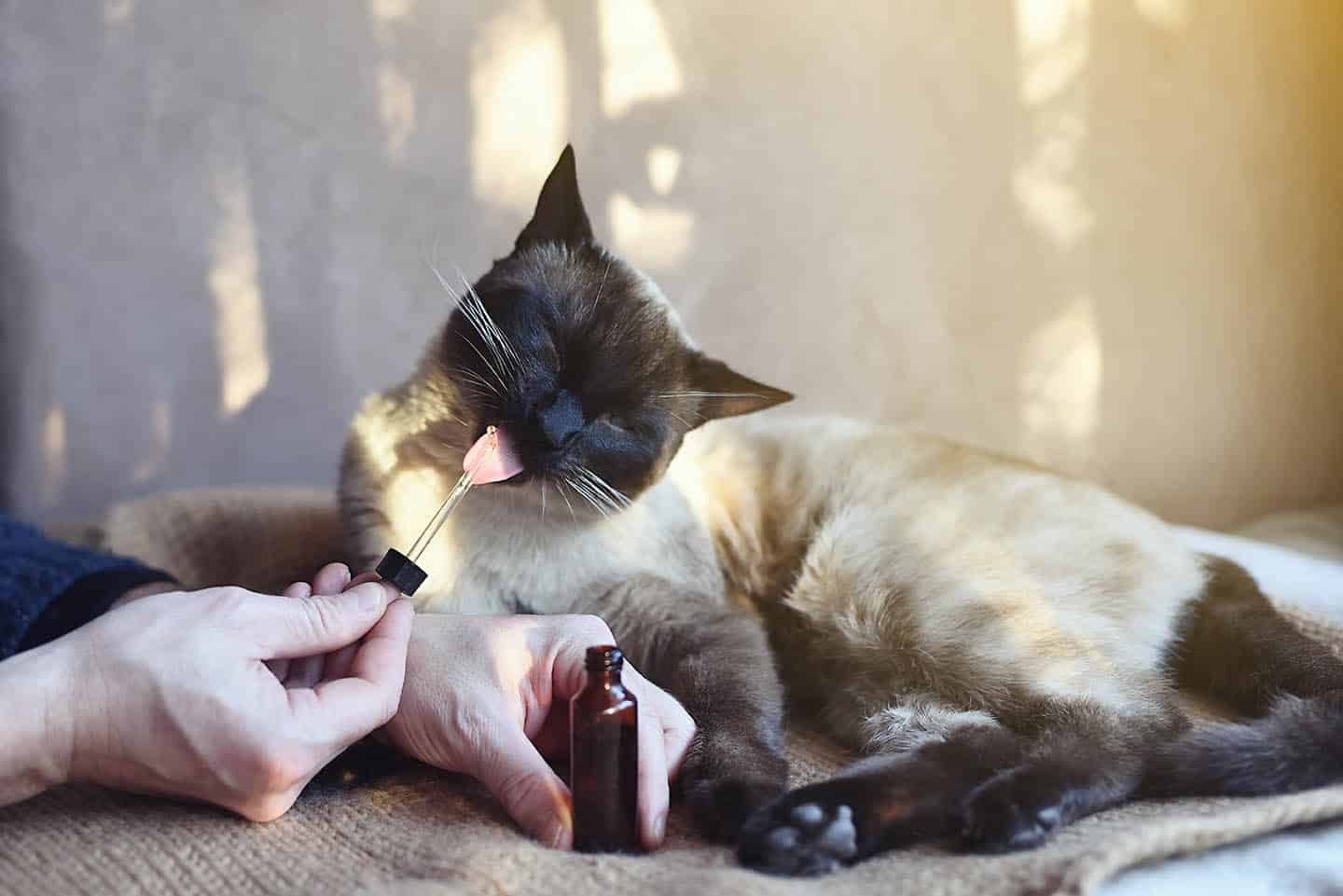
Relief from Stress, Anxiety, & Depression
CBD is often used to reduce stress, anxiety, and depression, and it works the same for our feline friends. If your cat is suffering from kidney disease or another medical condition, it may also suffer from separation anxiety, increased stress levels, and even depression. CBD provides relief from the overwhelming feelings of anxiety and depression, even for our cats. CBD oil can stimulate the brain receptors that monitor fear, anxiety, stress, and overall mood.
Decrease in Vomiting
If your cat is suffering from kidney disease, the resulting buildup of unfiltered waste in their blood can cause them to experience nausea and subsequent vomiting. This can result in weight loss and further affect their appetite. CBD can help to control nausea and vomiting. According to a 2011 study, CBD helps with nausea by reacting with the body’s serotonin receptors.
Helps the Endocannabinoid System
The Endocannabinoid System (ECS) functions similarly for humans as it does for our pets. All animals have an ECS; this includes cats, dogs, horses, monkeys, dolphins, and even starfish. The ECS system helps maintain a healthy and natural internal balance for cats, dogs, and humans. The cannabinoid receptors triggered by the ECS system affect everything from nerve growth, inflammation, the immune system, pain receptors, and emotions like anxiety.
Using CBD can boost your cat’s natural ECS functions and allow endocannabinoids to stay present in their system longer.

Is CBD Oil for Cats with Kidney Disease Safe?
Giving your cat CBD oil is safe. As you would with any supplement, monitor it closely and consult a veterinarian before serving it to your cat. Many pet owners have shared stories about how using CBD with their cats has improved their cat’s life and lessened the symptoms of their kidney disease. While not scientifically confirmed, anecdotal evidence shows that CBD oil causes a noticeable improvement.
While the use of CBD oil is safe, make sure you do not give your cat CBD oil containing TCH. TCH is the chemical responsible for causing the neurological side effects of cannabis. Consuming TCH will affect your cat’s basic motor functions and can even lead to agitation and aggressive behaviors. TCH is also toxic to cats.
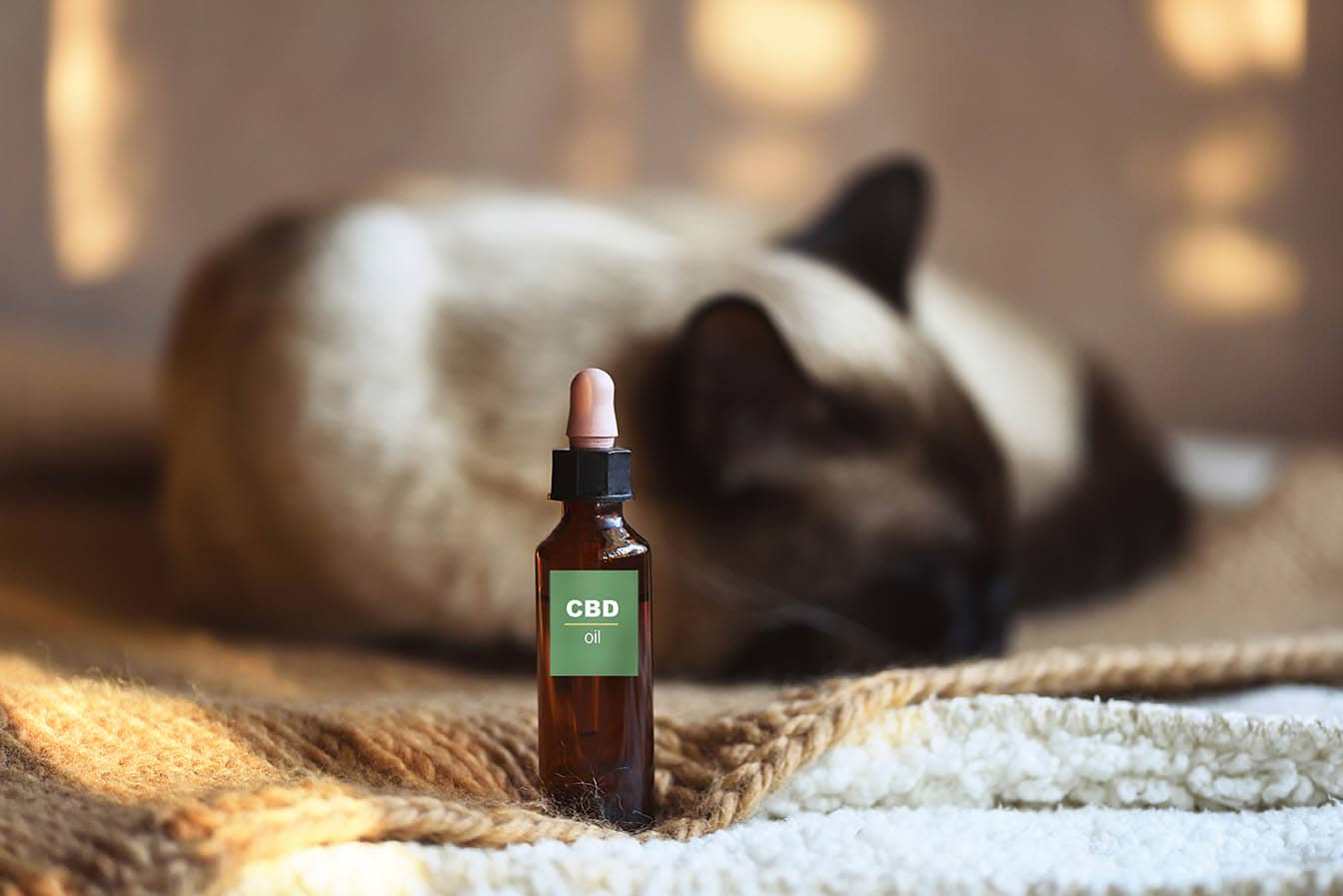
Final Thoughts
Giving your cat CBD oil to help relieve their symptoms of kidney disease is more than okay. As a pet owner, it is your responsibility to ensure it is properly certified CBD and that it contains less than 0.3% TCH levels. Make sure it comes from a good source, has certified laboratory testing, and does not contain any additives. CBD will help to relieve many symptoms of kidney disease for your beloved feline, allowing your furry friend to enjoy their life again.
Featured Image Credit: New Africa, Shutterstock
Contents
- Kidney Disease in Cats
- What is CBD Oil & Is It Safe for Cats?
- How Does CBD Benefits Cats with Kidney Disease
- Pain Control
- Decrease in Inflammation Within the Body
- Relief from Stress, Anxiety, & Depression
- Decrease in Vomiting
- Helps the Endocannabinoid System
- Is CBD Oil for Cats with Kidney Disease Safe?
- Final Thoughts

